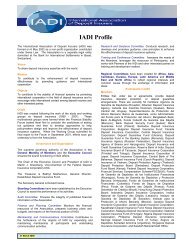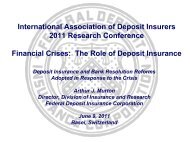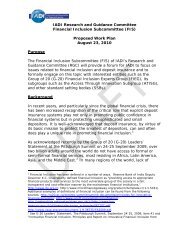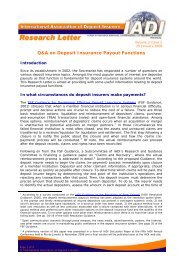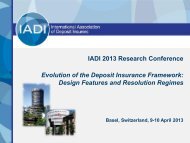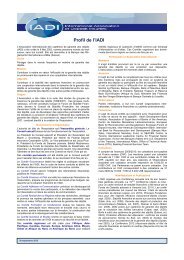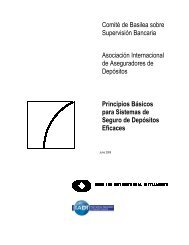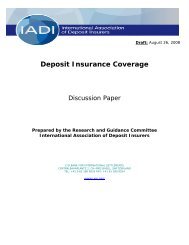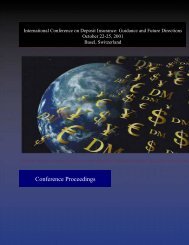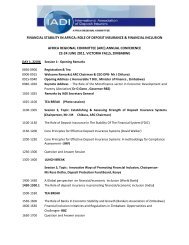Volume II - PDF - International Association of Deposit Insurers
Volume II - PDF - International Association of Deposit Insurers
Volume II - PDF - International Association of Deposit Insurers
- No tags were found...
You also want an ePaper? Increase the reach of your titles
YUMPU automatically turns print PDFs into web optimized ePapers that Google loves.
•BACKGROUND DOCUMENTS•<br />
Part I: Research<br />
<strong>Deposit</strong> insurance systems and the<br />
European Union<br />
A special situation prevails in Europe where the<br />
harmonisation <strong>of</strong> banking regulations in the<br />
European Union (EU) has led to the creation <strong>of</strong> the<br />
European passport. Included among the features<br />
<strong>of</strong> the passport is the fact that banks, including<br />
their branches in other member states, are supervised<br />
only by their home authority. According to<br />
the deposit protection directive adopted by the<br />
EU, the deposit protection scheme in a bank’s<br />
home state also has to cover deposits <strong>of</strong> branches<br />
in host member states. This coverage may be<br />
enlarged—or topped up—by the statutory deposit<br />
protection scheme <strong>of</strong> the host member state. 5<br />
Non-bank financial institutions<br />
Countries take different approaches toward the issue<br />
<strong>of</strong> membership for non-bank financial companies—<br />
finance companies, credit unions and cooperatives,<br />
for example—that <strong>of</strong>fer deposits and deposit-like<br />
products and are subject to an appropriate level <strong>of</strong><br />
prudential supervision. The rationale for expanding<br />
membership to non-bank financial institutions<br />
includes, the desire to accord similar treatment<br />
to institutions that <strong>of</strong>fer similar deposit-like<br />
products and the desire to enhance financial stability<br />
by expanding the safety net to include those<br />
institutions that <strong>of</strong>fer deposit-like products.<br />
On the other hand, there are many cases where<br />
non-bank financial institutions are not eligible for<br />
membership. The most common reason for excluding<br />
these institutions is that they are subject to less<br />
stringent supervisory standards. For some countries,<br />
a different governmental authority licenses nonbank<br />
financial institutions. In such cases, extending<br />
membership may lead to constitutional or political<br />
issues that are difficult to overcome. Some countries<br />
have addressed this problem by establishing a<br />
separate insurance system or fund.<br />
State-owned banks<br />
State-owned banks present unique issues for deposit<br />
insurance schemes. Because state-owned banks are<br />
normally the beneficiaries <strong>of</strong> an implicit, full<br />
government guarantee, their inclusion in a deposit<br />
insurance system may appear to be unnecessary.<br />
However, some countries have chosen to include<br />
state-owned banks in their deposit insurance<br />
systems. Some <strong>of</strong> the reasons cited for inclusion<br />
are: to replace the implicit guarantee <strong>of</strong> the stateowned<br />
bank with explicit, limited coverage, thereby<br />
levelling the playing field for all deposit-taking<br />
institutions; to diversify the risks and revenue base<br />
<strong>of</strong> the deposit insurer; to facilitate the privatisation<br />
<strong>of</strong> state-owned banks; and to introduce an<br />
enhanced supervisory regime.<br />
Should Membership Be<br />
Compulsory<br />
Experience has shown that voluntary deposit<br />
insurance systems have been more prone to crisis<br />
than compulsory ones because <strong>of</strong> problems such<br />
as adverse selection, among others. 6 Compulsory<br />
membership allows a deposit insurance system to<br />
avoid this problem. Moreover, all banks—even the<br />
safest and soundest—benefit from the existence <strong>of</strong><br />
a well-designed deposit insurance system.<br />
In some cases depository institutions have demonstrated<br />
their commitment to join a deposit insurance<br />
system without the necessity <strong>of</strong> statutory<br />
obligation. The commitment <strong>of</strong> banks to participate<br />
in deposit protection schemes, without being<br />
legally obligated to do so, may be driven by the<br />
strong desire <strong>of</strong> depositors for such coverage. On<br />
the other hand, if depositors are less concerned<br />
about the availability <strong>of</strong> deposit protection or are<br />
not aware that coverage may be limited to certain<br />
financial institutions, then depository institutions<br />
may opt-out <strong>of</strong> participation in the deposit insurance<br />
system. Their decision to do so may have<br />
implications for the financial solvency <strong>of</strong> the deposit<br />
insurance system or its ability to meet a country’s<br />
public-policy objectives.<br />
Incentives for eligible institutions to join a voluntary<br />
deposit insurance system may be enhanced if<br />
the system is privately organised and operated<br />
through a private contract. 7 Membership criteria<br />
42<br />
Guidance for Developing Effective <strong>Deposit</strong> Insurance Systems: <strong>Volume</strong> <strong>II</strong>



